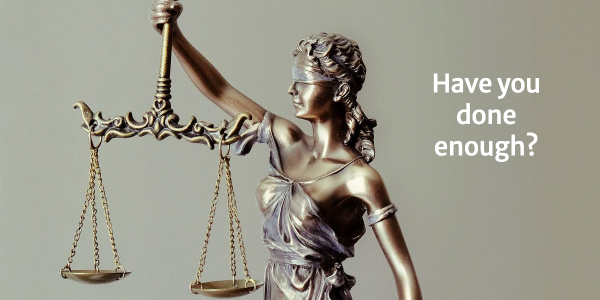
A recent blog post from someone I admire suggested that writers should approach every project as if it were the most important thing they’ve done. Give it our all, every time. (Here’s the post if you’re interested.)
This is inspiring advice. But taken to the extreme, it’s not practical. Inspirational posters aside, you cannot go through days giving everything your all. Life throws too much at us to live this way.
Treat your work seriously, of course. But protect your creative energy as well.
I prefer a more nuanced approach: due diligence.
Learning from the lawyers
Years ago, I worked at a tech startup. One day, a team of lawyers, accountants, and other people in suits showed up for closed-door meetings with our management. They were representatives of a larger company interested in acquiring us, and they were doing due diligence.
That was the first time I’d heard the term, but I’ve seen it many times since.
Companies do due diligence before acquiring others, so they can face the press and stakeholders if the acquisition doesn’t work out. In the legal environment, the term refers to taking “reasonable measures” to avoid harming others. For example, “Did the company exercise due diligence in preventing an accident?”
Due diligence. It’s such a lawyerly term, asserting a standard of what is “due” without defining it. It embodies uncertainty and wiggle room—and that’s a good thing.
In a quickly changing world, we can never completely understand everything or protect against every failure.
For example, in this acquisition, we had to reveal enough to support the purchase decision, but not so much that if the deal fell apart, they’d have our intellectual property and out-compete us in the future.
The concept of due diligence admits that we must act based on the imperfect information available to us, and our ability to chase it down. We can only commit to making a reasonable effort.
That approach works for writing as well.
Due diligence for writers
This concept helps when you face situations where you aren’t sure when to stop or how much you need to do. For example:
- How much research should I do for this blog post?
- How many interviews do I need for the book?
- How many edit passes should I take?
- How many early readers do I need?
What’s enough for each of these situations? What constitutes reasonable effort?
It depends. Your assessment of reasonable effort changes according to the project.
- A book may require more rigorous research than a blog post. (Books last longer and are harder to change.)
- Writing about healthcare or legal issues imposes a higher standard of diligence than offering writing advice.
As an example, I spend less time polishing and editing blog posts like this one than I do my books. Otherwise, I’d never manage even my bi-weekly cadence and have time or energy for other writing.
How do you determine the right level?
There’s the rub. You might look at what other writers like you do. But that’s not necessarily the best approach.
Instead, think about the person who deserves your diligence—the reader.
What does the reader need and expect from this piece? That’s the basis for determining due diligence in writing.
- If you’re writing a poem, the reader deserves and expects finely polished, carefully crafted words.
- If someone asks you for a quick explanation of how to tackle a project at work, they would rather receive it promptly than wait days for you to craft each sentence with loving care.
Applying the concept of due diligence prevents us from spending so much time optimizing and perfecting that we have nothing left to create other works that the reader might need.
You have to ship the work at some point. Due diligence helps you understand when.
Going further when it counts
Then there are writing projects that you pour your heart into, going well beyond any measure of due diligence. The ones you put crazy amounts of love and effort into.
These projects deserve the extra effort, if not for the reader, then for your own sake. The trick is identifying works that need only due diligence, and those into which we pour ourselves more deeply.
We can only make time for the most important projects by defining a sufficient, reasonable effort for other things.
When you learn to apply a standard of reasonable effort, you will have the time and energy to go beyond and deliver work that delights or surprises.